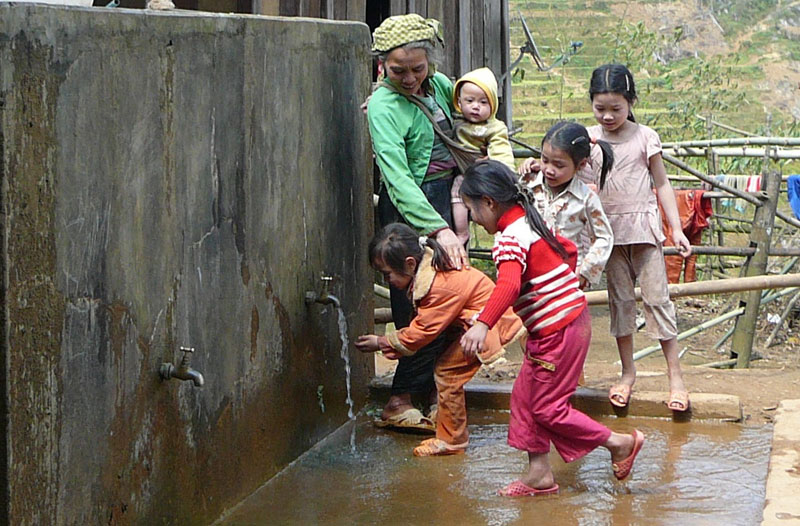
(HBO) – Hoa Binh province has carried out many governmental support policies for the poor in an effective, timely manner to foster sustainable poverty reduction. These policies have contributed to developing local production, improving people’s income, particularly the poor and people from ethnic minority groups.
 People in the mountainous
commune of Quyet Chien, Tan Lac district have access to clean water from a
project funded by Programme 135.
People in the mountainous
commune of Quyet Chien, Tan Lac district have access to clean water from a
project funded by Programme 135.
The total fund
for the implementation of the national target programme for sustainable poverty
reduction in Hoa Binh exceeds 1.185 trillion VND from 2016 – 2020.
Over 3.1 trillion
VND has been provided in soft
loans for the poor and near-poor households; people going to work abroad as
guest workers; and those in disadvantaged areas; or to develop household
businesses, forest farming and husbandry; construct clean water supply and
rural environmental sanitation projects; and create jobs.
Over the last
five years, all poor and near-poor households, ethnic minority people living in
disadvantaged and extremely disadvantaged areas have been covered with free
health insurance while students from extremely disadvantaged villages and
communes have received financial aid to cover tuition fees and expenditure.
Thanks to such
effort, the province’s poverty rate fell by 3.09 percent annually in average
from 2016 – 2020. At the same time, average income of the poor and near-poor
households increased from 44.58 million VND per year in 2016 to 55.1 million
VND per year in 2019.
Over 80 percent
of the communal main roads have been concreted; 80 percent of commune-based
medical stations now have sufficient facilities to delivery healthcare services
covered by health insurance and 75 percent of local households have access to
clean water./.
With just over a month left until the school summer break, students are eagerly anticipating a period of rest and fun after a year of academic pressure. To provide a healthy environment for the physical development, in addition to the classes that foster talents and enhance the academic knowledge, sports and physical activities continue to attract a large number of children and teenagers.
On April 17th, Hoa Binh Provincial Museum organized a program to promote and introduce the outstanding values of "Hoa Binh Culture” at the Boarding Secondary and High School for ethnic minority students in Mai Chau District.
The Hoa Binh College of Technical Technology, in collaboration with the Hoa Binh Technical and Economic College and the provincial Association of Literature and Arts, hosted a gathering on April 15 to celebrate Laos’ traditional Bunpimay (New Year) Festival 2025 and debut the new book "Nguoi Muong o ban Don” (Muong people in Don village).
In the millennia-long history of national construction and safeguarding, people of all ethnic groups in Hoa Binh have been united and closely bound together to overcome all difficulties and challenges, standing alongside the entire Vietnamese people throughout the history of building and defending the country.
Living green is a healthy, positive, and sustainable lifestyle that not only helps protect
the environment and quality of life but also conserves natural resources and ecosystems.
Among the many ways to embrace this lifestyle, reducing plastic consumption is one of the most impactful.
The women's unions at all levels in Kim Boi district have been making significant contributions to the movement of building cultural life in the local community.
The movement helps improve rural look and the spiritual and material lives of local residents.



 People in the mountainous
commune of Quyet Chien, Tan Lac district have access to clean water from a
project funded by Programme 135.
People in the mountainous
commune of Quyet Chien, Tan Lac district have access to clean water from a
project funded by Programme 135.